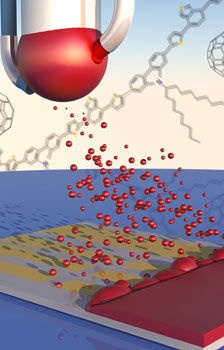According to a physicist’s report, a research team at the University of Sheffield in the United Kingdom recently applied a spraying technique to the development of perovskite solar panels. The application of this material and technology will help reduce the cost of solar power generation. Experts from the Faculty of Physics and Astronomy at the University of Sheffield and the School of Chemical and Biological Engineering had previously used spray technology to produce solar cells for organic semiconductor materials. The use of perovskite materials is a major advancement on this basis.

A British research team has made significant progress in the use of spray technology to produce perovskite solar panels. It is expected to significantly reduce the cost of solar power generation.
Photovoltaic materials based on metal halide perovskites were first exhibited in 2012. Now this technology has become a very promising material choice in the field of solar cells, because it combines the characteristics of high efficiency and low cost. The use of material spraying technology will minimize the waste of materials and be more suitable for large-scale production applications - a bit like the automotive painting and image printing industries.
Professor David Lidzey, the chief scientist, said: “People are very interested in photovoltaic materials based on perovskites.†He said: “More importantly, this material will be expected to set high performance in mature solar cell materials. With the low-cost manufacturing of organic optoelectronic materials."
Most of the current solar panels are made using energy-intensive materials, such as silicon, meaning that the energy required to produce such materials is high. In contrast, the energy required to produce perovskite materials is much lower. By adopting an intensive spray process, the research team expects further cost reductions.
Professor Leeds said: “The best energy conversion power record for organic solar panels is about 10%. Currently, solar panels with perovskite materials have achieved 19% conversion efficiency, and 25% conversion rate from silicon solar panels has been achieved. However, silicon solar panels currently occupy the absolute monopoly position in the market,†he said. “The perovskite solar panels we research and develop still use similar structures to organic solar cells. What we are doing is mainly to replace them. The core material of the light absorption layer, namely the organic layer, was replaced by a sprayed perovskite layer. The use of a perovskite layer in place of the organic absorption layer resulted in a significant increase in the energy conversion rate of the product.
A team at the University of Sheffield found that by spraying perovskite layers, they can increase the efficiency of their original solar panels by about 11%. Professor Leeds said: "This achievement further advances the existing work and marks that the perovskite coating technology will begin to gradually move out of the laboratory. This is a crucial step towards efficient and low-cost solar panels."
Solar energy is becoming an important part of the global renewable energy field. Despite the global economic difficulties, the solar cell market still maintains a high growth momentum. Professor Leeds said: "I believe that this kind of thin film photoelectric conversion technology will play an important role in boosting solar energy applications. Among these, the adoption of perovskite materials will be promising."
Fermator Elevator Door Parts, Fermator Lift Door Parts
Fermator Group is the largest mono-product manufacturer of automatic doors for lifts in the world. Fermator doors are installed worldwide for light, medium and heavy traffic duty lifts, for domestic use, offices, airports, hotels and public buildings.
Year after year major investment has been made within the Group in order to increase production capacity, improve quality standards and provide the highest level of service to all our customers in more than 90 countries.
With headquarters in Spain and production plants located in France, Italy, Poland, Greece, India, China and Brazil, the Fermator Group responds effectively to the demands of all markets requiring automatic doors for lifts resulting in a major worldwide market share.
The automatic doors manufactured by Fermator comply with International Standards; EN 81-1/2, ASME A17.1-2000, and fire requirements EN 81-58 and UL 10B among numerous others.
Fermator Elevator Door Parts, Fermator Lift Door Parts
CEP Elevator Products ( China ) Co., Ltd. , https://www.zjelevatorcontrolsystem.com
